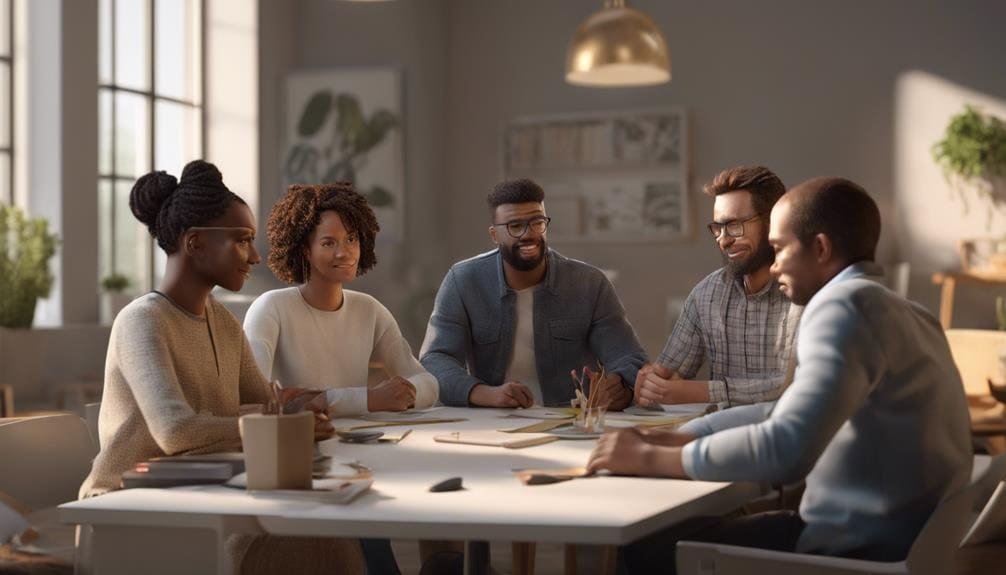Collaborative Learning as a Soft Skill
Collaborative learning as a vital skill equips you to excel in connected settings. It sharpens teamwork, problem-solving, communication, and respect for varied viewpoints. Building collaborative skills is essential in today's globalized world for boosting productivity, fostering innovation, and ensuring clearer exchanges of ideas. To enhance collaboration abilities, seek diverse perspectives, focus on effective communication, and hone problem-solving skills. The impact of collaborative learning on success includes improved team dynamics, enhanced problem-solving, increased innovation, and collective knowledge utilization. Understanding teamwork dynamics, employing effective communication strategies, and utilizing problem-solving techniques are practical applications of these essential skills. Broaden your horizons for more insights.
Key Takeaways
- Collaborative learning enhances soft skills like teamwork and communication.
- It fosters problem-solving abilities and respect for diverse perspectives.
- Developing collaboration skills is essential in an interconnected world.
- Strategies include seeking diverse perspectives and providing constructive feedback.
- It impacts success by improving teamwork dynamics, problem-solving, and innovation.
Importance of Collaborative Learning
Collaborative learning plays an important role in fostering teamwork and enhancing problem-solving skills among individuals. When engaging in group projects, teamwork dynamics come into play, allowing members to leverage each other's strengths and work together towards a common goal. Through collaboration, individuals learn how to communicate effectively, share responsibilities, and respect diverse perspectives within a team setting.
In group projects, teamwork dynamics can greatly influence the overall success of the team. By working together, team members can brainstorm ideas, provide feedback, and support one another throughout the project. This collaborative effort not only enhances the quality of the final outcome but also promotes a sense of unity and camaraderie among team members. Additionally, collaborating on tasks helps individuals develop pivotal problem-solving skills as they navigate challenges and find solutions together.
Benefits of Developing Collaboration Skills
To excel in today's interconnected world, honing your collaboration skills is essential for maneuvering complex challenges and achieving collective success. Developing collaboration skills offers a range of benefits that go beyond personal growth and professional success. By enhancing teamwork, individuals can achieve higher levels of productivity and innovation.
Fostering communication within a collaborative environment leads to clearer exchanges of ideas and information. Building strong collaboration skills also nurtures a sense of trust and mutual respect among team members, creating a supportive and harmonious work atmosphere. Additionally, effective collaboration enables individuals to leverage diverse perspectives and skill sets, resulting in well-rounded solutions to intricate problems.
Strategies for Enhancing Collaboration Abilities
Enhancing your collaboration abilities involves actively seeking out opportunities to engage with diverse perspectives and leverage collective strengths for more innovative problem-solving. To enhance your collaboration skills, start by focusing on effective communication. Clear and open communication is essential for successful collaboration. Actively listen to others, express your ideas clearly, and make sure that everyone involved in the collaboration process feels heard and understood.
Moreover, problem-solving is at the core of collaboration. Work on developing your problem-solving skills by approaching challenges with a solution-oriented mindset. Encourage brainstorming sessions where all team members can contribute their ideas freely. Embrace different viewpoints and approaches to problem-solving to foster a more creative and effective collaborative environment.
Additionally, establish clear goals and objectives for the collaborative efforts to ensure everyone is aligned and working towards a common purpose. Regularly evaluate progress, provide constructive feedback, and make adjustments as needed to enhance the overall effectiveness of the collaborative process. By honing your communication skills and problem-solving abilities, you can notably enhance your collaboration skills for more successful outcomes.
Impact of Collaborative Learning on Success
Improving your success potential through collaborative learning involves harnessing the collective knowledge and skills of a group to achieve greater outcomes. By working together with others, you can tap into various perspectives and expertise, leading to enhanced problem-solving abilities and increased productivity.
Here are some key impacts of collaborative learning on success:
- Enhanced Teamwork Dynamics: Collaborative learning fosters communication, trust, and cooperation among team members, leading to a more cohesive and effective group dynamic.
- Improved Group Problem Solving: By pooling together different ideas and approaches, collaborative learning enables teams to tackle complex problems more efficiently and creatively.
- Increased Innovation: Collaborative learning encourages out-of-the-box thinking and innovation through the cross-pollination of ideas and diverse viewpoints.
- Heightened Accountability: Working collaboratively promotes a sense of shared responsibility and accountability, motivating team members to perform at their best and aim for collective success.
Practical Applications of Collaborative Skills
Leverage your collaborative skills in real-world scenarios to enhance problem-solving capabilities and drive innovative solutions. When engaging in group projects, understanding teamwork dynamics is essential for success. Communication strategies play a pivotal role in ensuring that all team members are on the same page and working towards a common goal. By actively listening, offering constructive feedback, and fostering open dialogue, you can create a positive team environment conducive to productivity.
In addition to communication strategies, problem-solving techniques are vital for tackling challenges effectively. Encouraging brainstorming sessions where all team members can contribute ideas fosters creativity and helps in finding the best solutions. Utilizing tools like mind mapping or SWOT analysis can provide a structured approach to problem-solving within the group.
| Teamwork Dynamics | Communication Strategies | Problem-Solving Techniques |
|---|---|---|
| Establishing roles and responsibilities | Active listening and feedback | Brainstorming sessions for idea generation |
| Building trust and rapport among team members | Open and transparent communication | Utilizing mind mapping or SWOT analysis |
| Resolving conflicts constructively | Setting clear goals and expectations | Encouraging a systematic approach to problem-solving |
Conclusion
To sum up, cooperative learning is an essential soft skill that can greatly influence your success. By collaborating with others, you can accomplish more, gain insights from various perspectives, and develop as a team.
Remember, 'a chain is only as strong as its weakest link,' so enhance your collaboration skills to unleash your full potential.
Keep aiming for the stars, because the sky's the limit when you embrace the power of collaboration.








